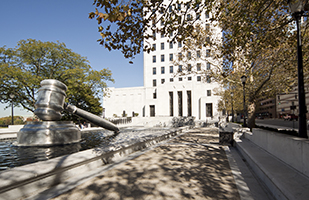State’s High Court To Hear Eight Cases

Cases before the Court this session deal with hidden drugs, OVI blood tests, religious radio stations, reopening appeals, gas bills, insurance policy exclusions, and a bar application.

Cases before the Court this session deal with hidden drugs, OVI blood tests, religious radio stations, reopening appeals, gas bills, insurance policy exclusions, and a bar application.
The Ohio Supreme Court has eight appeals on the calendar for oral arguments next week, including a case involving the delayed refrigeration of a blood sample taken from an alleged drunk driver and a question about when concealing drugs becomes a tampering-with-evidence offense.
The Court will consider four cases on Tuesday, Oct. 13 and four more on Wednesday, Oct. 14, beginning at 9 a.m. at the Thomas J. Moyer Ohio Judicial Center in Columbus. Arguments will be streamed live online at sc.ohio.gov and broadcast live on The Ohio Channel.
Previews Available
Along with the brief descriptions below, the Office of Public Information today released in-depth previews of the cases.
Cases for Tuesday, Oct. 13
- Dayton customers enrolled in a program to pay a fixed cost for their monthly gas bills are required to stay on the program for 12 months to prevent them from leaving when gas charges are lower and rejoining when they are higher. The woman who filed a complaint in a PUCO case argues she shouldn’t have to pay her outstanding bills from the program before re-enrolling because she was overcharged, forced off the program, and discriminated against.
- Grange Mutual Casualty Company v. World Harvest Church asks the Court whether a company that insured a church in Franklin County must pay more than $1 million in a case involving a child hit by an employee at a church preschool program. The church was found partly responsible for the teacher’s actions, and the child’s family was awarded nearly $3 million at trial. The insurance company contends it doesn’t have to pay any part of the damages because the church’s insurance policies don’t cover abuse and molestation.
- A woman arrested in Scioto County for trafficking and possessing heroin contests her conviction in Barry v. State for tampering with evidence. Before leaving on a drive from Middletown to West Virginia, the woman concealed the drugs inside her body. The jury was told she was guilty of tampering if she knew when she hid the heroin that she was committing a crime. That instruction conflicts with a recent Ohio Supreme Court decision and misled the jurors about the law, which resulted in her wrongful conviction for this offense, she asserts.
- The board that reviews the character and fitness of people who apply to be lawyers in the state recommends disapproval of the application of a man convicted in the late 1990s for sexual offenses involving minors. The man, who has attended law school in northern Kentucky and is in his 60s, maintains in In re Application of Tynes that he has fully disclosed the crimes, has taken responsibility for his actions, and hasn’t been charged with any other crimes.
Cases for Wednesday, Oct. 14
- Blood samples were taken from a man involved in a fatal Ashtabula County crash in 2011. The issue in State v. Baker is whether the blood, which was left in the patrol officer’s cup holder for more than four hours, was unrefrigerated for too long. The trial court suppressed the samples as evidence and concluded the state didn’t meet the legal requirements for handling bodily fluids. The state contends that other cases have permitted blood samples to be unrefrigerated for longer time periods and that the delay in this case didn’t affect the outcome of the trial.
- The owner of three Christian radio stations asserts in Christian Voice of Central Ohio v. Testa that one of its properties should be exempt from property taxes because the building is used primarily for public worship. The owner notes the Gahanna station is part of a not-for-profit corporation with a religious and educational purpose, the station plays contemporary Christian music, and the building includes a chapel where employees regularly meet. In addition, the previous location was tax exempt as a house of worship, the owner maintains.
- A Cleveland man was convicted when he was 17 of murder and assault for killing a guy who had dated his sister. He asks the Court in Williams v. State to allow him to reopen the appeal of his convictions with a new attorney because his lawyer at the time was ineffective. He claims he has shown good cause for filing his request past the standard deadline because he was young, inexperienced with the legal system, and his attorney didn’t discuss the appeal, the outcome, or his options with him.
- In re Messer v. JP Morgan Chase Bank was submitted by a federal court for review of questions about state mortgage laws. A Canal Winchester couple who filed for bankruptcy argues they can avoid responsibility for the home loan because their mortgage wasn’t signed by a notary as the law requires. The filing of the mortgage in the recorder’s office also doesn’t serve as notice of the mortgage because that law is inapplicable in this case, they maintain.


